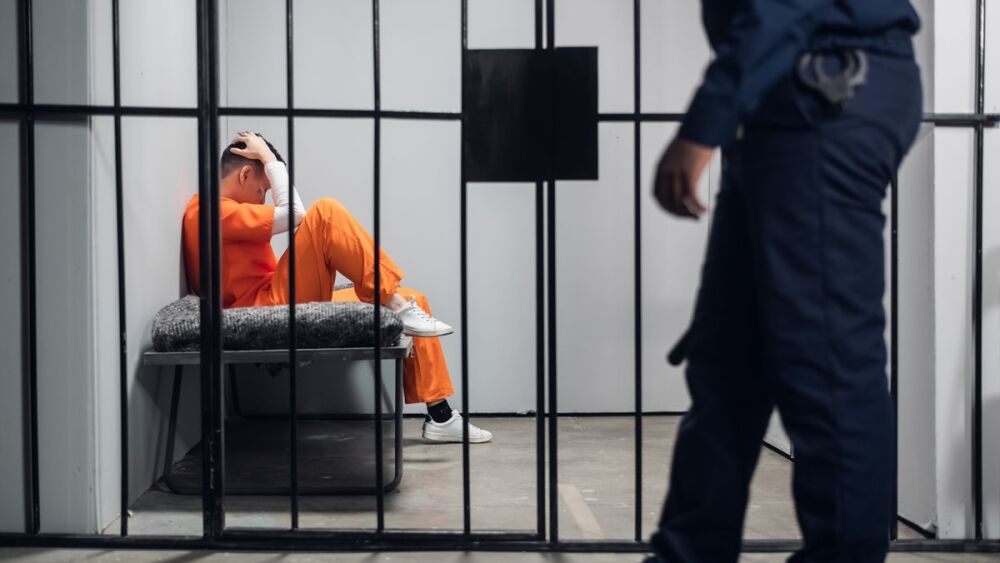This column was originally posted on Jeff Keller’s blog, Jail Medicine.
As you arrive to work at a jail medical clinic, you are told about five different jail patients. Each of the five carries a totally different diagnosis, but all have one thing in common. What is it? Fill in the blank.
Patient one is a 52-year-old man booked into jail four days ago for a DUI. He seemed all right for the first two or three days, but now, you are told, he has not eaten anything for 24 hours and last night he ____________________.
Patient two is a 24-year-old woman who was arrested yesterday for refusing to leave a grocery store as it was closing. Since her arrival at the jail, you are told, she has been talking non-stop in a very loud voice and last night she ____________________.
Patient three is a 19-year-old man who was arrested for drug possession. The deputies have not been able to book him because he also has been talking loudly and nonstop, although, unlike patient number two, his speech is largely non-sensical. But like patient number two, last night he also ____________________.
Patient four is a 28-year-old homeless man who was arrested two days ago for taking his clothes off in the library. He is cooperative mostly but spends most of his time talking about being spied on by the FBI through the jail loudspeaker. He thinks any food prepared by the jail is poisoned so will only eat pre-packaged commissary items. Last night, he ____________________.
The last patient is a 76-year-old man who has been incarcerated in jail for over six months. He has never caused any trouble in all of that time until last night, when he was incontinent, resisted any efforts to change his clothes, and threatened the deputies. Oh, and also he ____________________.
I’m sure that you have figured out how to fill in the blanks with what these five very different patients have in common. They all did not sleep last night.
Patient number one is going through alcohol withdrawal. If he is disoriented and having “different place” hallucinations plus severe tachycardia, he already has Delirium Tremens and needs to go to the hospital. However, some withdrawal patients will become sleepless before they become delirious and so may be able to be successfully treated at the jail. Either way, the treatment for this patient is benzodiazepines and rehydration. You’ll know you have given him enough Valium or Ativan when he sleeps.
Patient number two is manic. Depending on how cooperative she is and the capabilities of the jail, she also may need urgent evaluation by a psychiatrist. Typical maintenance therapy for her would be a mood stabilizer like Lithium or Divalproex. However, an acutely manic patient who is not sleeping may first benefit from an antipsychotic and a benzodiazepine. First and foremost, she needs to slow down enough to sleep.
Patient number three is high on methamphetamine. The “antidote” to meth toxicity is benzodiazepines. Once he gets enough benzos on board to counteract the meth effects, he will sleep. Whether this takes place at the jail or the hospital depends, again, on how sick he is and the capabilities of the jail.
Patient number four is acutely psychotic. He should receive antipsychotics and, at least initially, benzodiazepines. Since he is paranoid, he may be resistant to taking these voluntarily. A psychiatric consult and court order may be needed to treat him and get him to sleep.
Patient number five is acutely delirious. There can be many causes for this, but in this particular case, the patient is septic from a urinary tract infection. He will need to go to the hospital, where treatment will include antibiotics and benzodiazepines to help him to sleep.
Treating sleeplessness
I have often heard jail practitioners say something like “We don’t treat insomnia in our facility.” This is, of course, incorrect. All of these sleepless patients, for example, must be treated and one important guide to the success of the treatment is that each patient goes to sleep. Of course, you will treat sleeplessness when medically appropriate to do so!
You might argue that these patients are not really insomniacs; insomnia implies wanting to sleep but being unable to do so. None of these patients complain about not sleeping. In my opinion, this semantic argument misses the point. Our patients need to sleep. We will treat those who are truly not sleeping, from whatever cause. Sleeplessness is almost always an important symptom pointing to a more serious underlying medical condition.
Since none of these patients will fill out a kite complaining of not sleeping, medical practitioners have to rely on our deputies and correctional officers to alert us about patients who are not sleeping. This underscores the importance of training our non-medical coworkers (who are often our eyes and ears) on what conditions and behaviors should be referred to medical.
Personally, even though I get a lot of calls when I am on-call, the problem is that I am not called enough rather than that I get called too much. One reason for this is that correctional officers sometimes have had bad experiences in the past from a cranky practitioner. We need to remember that deputies and correctional officers do not have our medical training and so are going to worry about things that maybe we wouldn’t.
Even if nine calls out of ten are perhaps unnecessary, that tenth call is critically important! Always thank the officer for calling, be kind and follow up.
As always, what I have written here is my opinion, based on my experience, training and research. I could be wrong!
What experiences have you had in your facility with a sleepless inmate? Email editor@corrections1.com.













